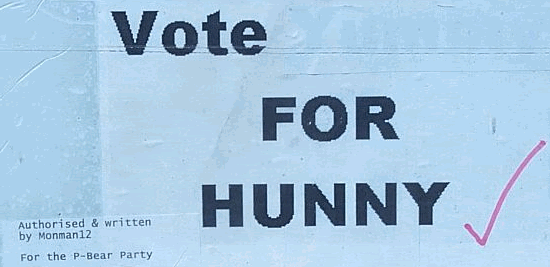
- The eBay Community
- Groups
- Fun & Social
- Community Spirit
- Re: Surprise! We have an election date :-D
- Subscribe to RSS Feed
- Mark Topic as New
- Mark Topic as Read
- Float this Topic for Current User
- Bookmark
- Subscribe
- Mute
- Printer Friendly Page
Surprise! We have an election date :-D
- Mark as New
- Bookmark
- Subscribe
- Mute
- Subscribe to RSS Feed
- Highlight
- Report Inappropriate Content
on 30-01-2013 01:06 PM
- « Previous
- Next »
Re: Surprise! We have an election date :-D
- Mark as New
- Bookmark
- Subscribe
- Mute
- Subscribe to RSS Feed
- Highlight
- Report Inappropriate Content
on 02-02-2013 01:13 AM
PSA: "....Child endowment was given decades ago to increase the population, and some of the allowances and bonuses now are for the same reason......"
Codswallop, in the "good old days" government grants were not so much a form of cynical hip-pocket largesse as today, and as for considering they were aimed at rewarding fecundity, more codswallop.I
Actually when Menzies introduced Child Endowment in 1941 he stated that the purpose of it was " to bridge the gap between the inadequacy of the basic wage and the needs of the family, also it was a logical adjunct of the wages system which would enable families to obtain a given absolute standard of living."
Momnan, how childlike to believe a politician's spin. Or do you believe that the revered (when he shouldn't have been) Menzies always told the truth?
Re: Surprise! We have an election date :-D
- Mark as New
- Bookmark
- Subscribe
- Mute
- Subscribe to RSS Feed
- Highlight
- Report Inappropriate Content
on 02-02-2013 07:39 PM
I'm fairly sure educational expenses were tax deductible in the days of child endowment as well.
Re: Surprise! We have an election date :-D
- Mark as New
- Bookmark
- Subscribe
- Mute
- Subscribe to RSS Feed
- Highlight
- Report Inappropriate Content
on 04-02-2013 03:02 PM
PSD: "Momnan, how childlike to believe a politician's spin." As opposed to unsourced posts here PSD, especially this one ?:
"Child endowment was given decades ago to increase the population"
Re: Surprise! We have an election date :-D
- Mark as New
- Bookmark
- Subscribe
- Mute
- Subscribe to RSS Feed
- Highlight
- Report Inappropriate Content
on 06-02-2013 07:21 AM
John Howard introduced the Education Tax Refund... I was on a single parents pension at the time. I use to save all of my receipts and claim the refund.... I did not have an income so did not have to do a tax return but I went through the claim to make sure i got the money.
How do you (someone who has benefited from the Education Tax Refund and perhaps (?) also it in it's new name of 'school kids bonus') feel about the idea of getting rid of the schoolkids bonus which replaced the Education Tax Refund ?
Funding has had an impact on attendance throughout our History.
The out of pocket expenses of an education today would I believe outweigh those of past decades? What is also different is the higher minimum leaving age as well as less funding/available places where trades are taught (ie, Higher tafe fees ,loss of technical high schools ).
This is a big read though I found it interesting.Would be good if it also covered some of this decade and the out of pocket expenses parents (tax payers) needed to pay throughout the years for public education.
http://www.abs.gov.au/Ausstats/abs@.nsf/0/A75909A2108CECAACA2569DE002539FB?Open
AUSTRALIAN SCHOOLS: PARTICIPATION AND FUNDING 1901 to 2000
Professor Gerald Burke and Dr Andrew Spaull
Gerald Burke is a Professorial Fellow and Executive Director of the Centre for the Economics of Education and Training, a joint centre of Monash University and the Australian Council for Educational Research. Andrew Spaull is a Reader in the Faculty of Education at Monash University specializing in history, politics and industrial relations in education. They have both been engaged in research in Australian education since the late 1960s.
INTRODUCTION
Education is not included as a Commonwealth power in the Constitution, and therefore it remains the responsibility of the States. However, the Commonwealth with its greater revenue base, especially after 1941, became involved in assisting with the funding of tertiary students and universities and then, notably from the 1960s, of the school system itself, in both public and private sectors. By the end of the century it provided over 40% of all public funds for education, had a dominant role in higher education and substantial influence and funding in vocational education and in schooling
This article has a limited scope. It examines participation in education, particularly secondary schooling, in Australia during the twentieth century and the funding system that underpins it. This necessarily involves comment on the quality of the education system in relation to the needs of the students of all social backgrounds and the Australian economy and society. And it involves outlining some of the key changes that occurred in the twentieth century and the political and policy issues that underlay them.
Although the Australian colonies readily embraced and almost implemented universal education in the last quarter of the nineteenth century, the challenges of secondary education, and the participation and destinations of adolescents in this stage of formal schooling, have dominated educational politics and planning during the entire twentieth century. Perhaps this was unavoidable because of the nature and position of secondary education in a modern democratic society. Of all the stages in schooling, secondary education is the most sensitive to both personal aspirations and societal demands. As the first national survey of secondary education (The Education of the Adolescent in Australia) observed in 1935: "Australian secondary education is still in the stage of transition. Perhaps it will never be in any other".
- « Previous
- Next »
- « Previous
- Next »



